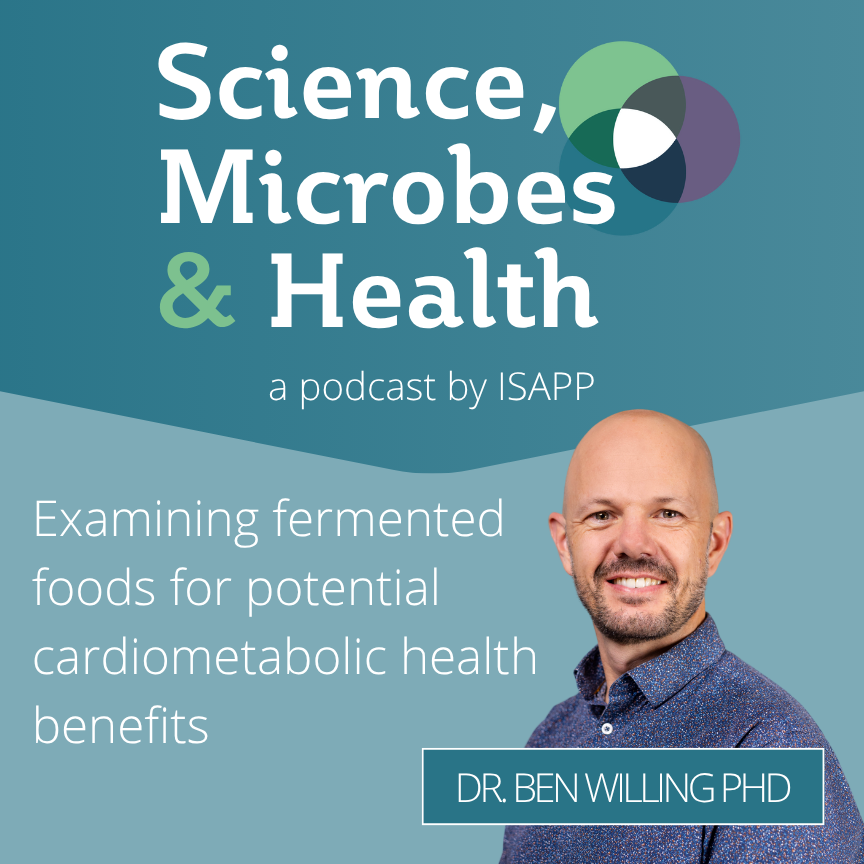Examining fermented foods for potential cardiometabolic health benefits, with Prof. Ben Willing PhD
Podcast: Play in new window | Download
Subscribe: Apple Podcasts | Spotify | RSS
This episode features Prof. Ben Willing PhD from the University of Alberta, Canada, speaking about his work investigating fermented foods such as kefir for potential cardiometabolic health benefits. The microorganisms associated with fermented foods are not standardized – for example, traditional kefirs have some microorganisms in common, but other microorganisms that are present sporadically. Moreover, kefir at the supermarket is created by taking microbial isolates (not necessarily associated with traditional kefir) and introducing them into the product. Several yeast species are present in traditional kefir but not in supermarket kefir. Prof. Willing studied the health benefits associated with traditional fermented kefir. His group found that specific kefir grains that could lower cholesterol in a mouse model and lower immune markers associated with cardiovascular disease; however, not all traditional kefirs had the same effect and supermarket kefirs were not effective. They isolated a set of 9 microorganisms to make the kefir in the lab, which were sufficient to replicate the effect. The ultimate goal is to produce a product that could be used at a commercial scale and is effective for human health. In initial human studies, the product showed a positive effect. Interestingly, a Canadian public survey about fermented foods found that consumers often expect a health benefit from fermented foods; this is an important area for future scientific and regulatory progress.
Episode abbreviations and links:
- Paper showing benefits of traditional kefir in a mouse model: Traditional kefir reduces weight gain and improves plasma and liver lipid profiles more successfully than a commercial equivalent in a mouse model of obesity
- Study showing the impact of kefir-associated microorganisms: Kefir microbial composition is a deciding factor in the physiological impact of kefir in a mouse model of obesity
- Human study: Consumption of kefir made with traditional microorganisms resulted in greater improvements in LDL cholesterol and plasma markers of inflammation in males when compared to a commercial kefir: a randomized pilot study
About Prof. Ben Willing PhD:
Prof. Willing is a Professor of Gut Microbiology and former Canada Research Chair (Tier 2) in Microbiology of Nutrigenomics in the Department of Agricultural, Food and Nutritional Science at the University of Alberta. He completed his PhD at the University of Saskatchewan studying the role of the microbiota in intestinal development in gnotobiotic pigs. His postdoctoral training was at the Swedish Agricultural University in Uppsala Sweden with Prof. Janet Jansson where he studied the relationship between the microbiome and inflammatory bowel diseases in a twin cohort, and at the University of British Columbia with Prof. Brett Finlay where he studied the impact of antibiotics and faecal transplantation on infection resistance and asthma. His research group is working to understand both fundamental and applied questions in gut microbiology, with a particular focus on how it interacts with diet and antibiotic exposures. Fundamental research includes identifying mechanisms through which specific core members of the microbiome regulate host physiology using gnotobiotic piglet and mouse models to understand their impact on infection resistance, metabolic disease and multiple sclerosis. Applied questions include developing and testing the impact of fermented foods on human health using clinical trials.
Sign up for our monthly newsletter
Follow us on LinkedIn, Bluesky, X, Facebook,







